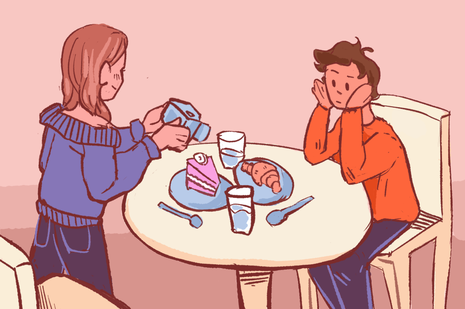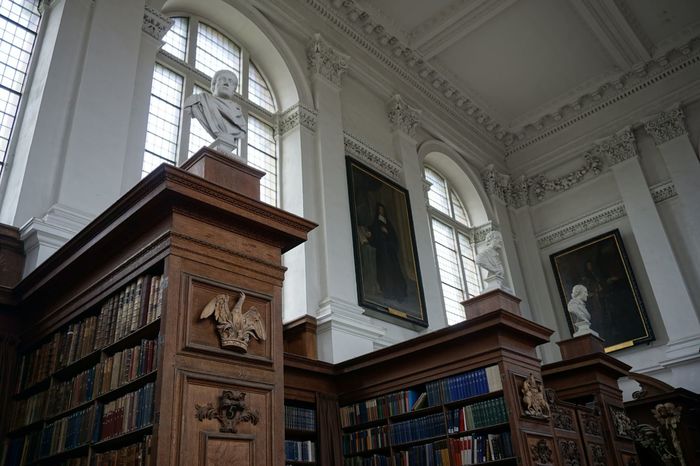Cambridge caught on camera – should we leave our phones behind?
Francesca Evans talks to avid-photographers and the camera-shy and asks what it really means to preserve a moment

The piano chords begin; the stadium is illuminated as if with starlight. I stand in the 02, watching a once-in-a-lifetime Coldplay concert, surrounded by LED wristbands flashing in extraordinary synchronicity. Chris Martin interrupts ‘A Sky Full of Stars’, asking everyone to put away their phones, put down their cameras and experience a fully ‘human moment’. Putting my phone in my pocket, and immersed in the wonder of the moment, I felt a rare and beautiful connection with 20,000 strangers.
Yet almost immediately, two women in front of me pulled out their phones, desperate to capture the song which was never meant to be photographed. That request, to forget the photo, to simply be present, has stayed with me back in Cambridge, where students are constantly torn between recording and living their memories. Whether it’s may balls, formals, or the mysterious traditions of the Night Climbers, the question lingers: how often do we try to capture what is hidden, and when do we just stop and look?
“How often do we try to capture what is hidden, and when do we just stop and look?”
Perhaps you have heard of Night Climbing, the elusive art of scaling the ancient buildings of the city, under the cover of darkness. Whispers of this age-old society are heard throughout time; from the infamous pseudonymous Whipplesnaith’s The Night Climbers of Cambridge in 1937, to a Palestine flag placed on the Seely library roof, and Varsity’s recent night climbers’ guide.
To this day, John Bulmer’s 1958 photographs of the Night Climbers remain, as he reflects that his snapshot is, “the only really professional images of the subject”. In this early work, John joined the night climbers, armed with a Canon 35mm and an open flash. High amongst the spires of King’s College Chapel, and the grandeur of St John’s tower, he had the privilege of fulfilling a photographer’s longing: “to photograph something hidden”. John told me that this endeavour has helped him pay “respect to the Night climbers,” and he hopes that these pictures “don’t fade” away.
When asked if there were any moments or subjects he consciously decided not to capture, John’s reflections on photography reveal moral boundaries: “I would not photograph something that would cause pain to a relative, like a dead body, for example, if the family were around”. A picture’s significance changes in a war situation, becoming necessary as “the world needs to know what is going on”.
On the other hand, John “regrets that I did not capture the Senate House Leap,” adding that it was “not for lack of trying”. The publication of the images on the front of The Sunday Times resulted in the engineering undergraduate’s early departure from Cambridge studies. But after this, photography became central to his life. The Night Climbers were immortalised in film, preserving an echo of exhilaration and a unique perspective of their slippery tradition.
“If the moment itself is not appreciated at the time, there may be nothing there to preserve”
Far from the dizzying heights of Cambridge rooftops, a notification from Instagram pops up: butterandjamontoast1 has posted a picture of a smoked salmon and cream cheese bagel. Photographing Cambridge through a different lens than John, I speak to spam curator Georgie Middlemiss about her thoughts behind the photo. Reflecting on the simple moment, she recalls being tired after work, and the bagel “just made me giggle because I was really happy with it!” For her, the freedom of posting arises from the way her dump acts “a little bit like a mood board of my life in a way”.
Looking back on this moment on her account brings back a simple pleasure, transporting her back to that park bench where it was taken. Unlike the tendency of a main social media account to present an “overglamorised version of like the reality of my life,” her spam account focuses on “weird or eclectic posts”.
Considering moments she chose not to photograph, Georgie reminisces on the novelty of her first year, where a night out was an exciting opportunity for new content. But now she can see the benefits of purely living in the moment, concluding that “sometimes moments are nice just to be in the moment for them”. This led me to consider the truly hidden parts of Cambridge: the photographs never taken.
Investigating further, I decided to speak to two third-year Law students, Shivraj Das and Max Hennessey. Unrelenting student life usually means that taking photos is the last thing on Shivraj’s mind. For Max, seeing a view “pretty enough to justify a picture” means he “prefers to just sit and enjoy it”. When asked how taking fewer photos affects the way he experiences events, Max’s appreciation is “on a more fundamental level, which leaves a deeper impression”. Perhaps the exact details of the moment have faded out of view, but the way the moment made him feel is even stronger.
“Let’s remember to pocket the phone on occasion”
Shivraj observes how often “phones come out the second fellows leave a formal to take photos,” or as soon as you reach the entrance, “before you’ve actually seen any of the May Ball.”
Max sees this phenomenon as “almost habitual – as soon as they see something beautiful, they feel compelled to photograph it before it disappears”. Although the ability to capture and relive the moment later is appealing, Max considers how this can also be “counterintuitive”. If the moment itself is not appreciated at the time, there may be nothing there to preserve.
Shivraj asks, “what are you actually keeping a record of?” When Shivraj looks back over a more limited camera roll he finds a single photo can “capture the vibe of the event and what I was feeling”. And, even if he were to regret not taking photos “there will always be someone else who can send me theirs!”
I love taking photos with my digital camera, my Polaroid, and my phone. Recollecting hidden scenes, from shadowy figures climbing King’s College stained-glass windows to a delicious bagel in the park, means preserving moments that would otherwise be lost to time and forgetting.
Nevertheless, we should also trust our memories to retain the worthwhile moments that Max trusts he will “carry with me”. Let’s remember to pocket the phone on occasion. We may discover that much like Chris Martin’s “human moment,” the most vivid memories of Cambridge might just be those left unrecorded.
 News / Judge Business School advisor resigns over Epstein and Andrew links18 February 2026
News / Judge Business School advisor resigns over Epstein and Andrew links18 February 2026 News / Hundreds of Cambridge academics demand vote on fate of vet course20 February 2026
News / Hundreds of Cambridge academics demand vote on fate of vet course20 February 2026 News / Petition demands University reverse decision on vegan menu20 February 2026
News / Petition demands University reverse decision on vegan menu20 February 2026 News / CUCA members attend Reform rally in London20 February 2026
News / CUCA members attend Reform rally in London20 February 2026 News / Gov grants £36m to Cambridge supercomputer17 February 2026
News / Gov grants £36m to Cambridge supercomputer17 February 2026










